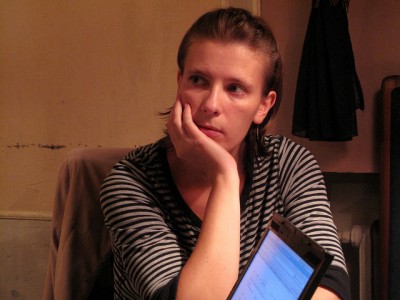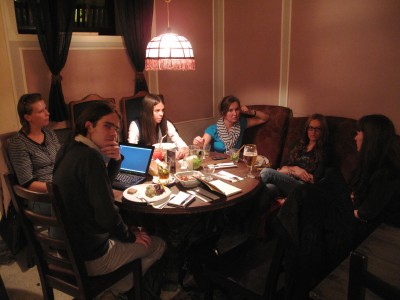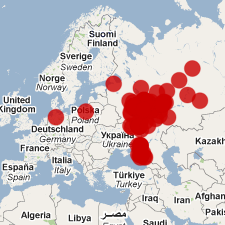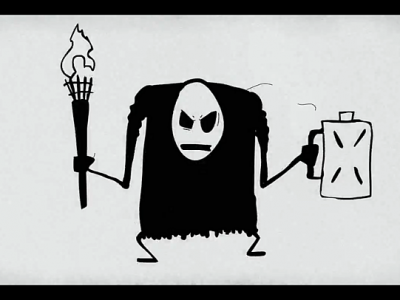Latest posts by Gregory Asmolov
Russia: More Photos of Nationalist Riot Near Kremlin
LiveJournal-user Zyalt [RUS] and DervishRV [RUS] published more photo reports of riots of soccer fans and nationalists that took place next to the Kremlin's wall in Moscow. After the protest has been dispersed the crowd started to attack everyone with non-Slavic look on the streets and in the metro.
Russia: Leading Activist Blogger on How Internet Changes Politics
Marina Litvinovich, is one of the most influential activist bloggers in Russia. In an interview with Gregory Asmolov, she shares her vision of the future role of the Internet in Russian politics.
“United Russia” Ideologist Calls to Forbid Official Blogs
Alexey Chadaev, a leading ideologist of “United Russia,” calls [RUS] to ban blogs and microblogs of senior Russian officials. Chadaev explains that blogging threatens the authority of the Russian political leadership since it has been always based on “three whales: miracle, secret and power,” in other words, exclusivity and distance from...
Russia: Blogger Navalny Tries to Prove That Fighting Regime is Fun
One of the most prominent Russian bloggers that use the Internet for fighting corruption in Russia, Alexey Navalny, gives interview to "RuNet Echo" He contemplates if the blogosphere can have a real political impact in Russia and share his further plans for using information technologies in the struggle against injustice.
Russia: Post-Emergency Sustainability of Crowdsourcing Projects
Gregory Asmolov analyzes the fate of the Ushahidi-based Help Map project after the wildfires have ended. What is the future of emergency projects and how can we make them more sustainable?
Russia: Intellectual Property Rights as NGO Prosecution Tool?
Rebecca MacKinnon calls for revising software copyright policy following the story in Irkutsk, where local authorities used the excuse of struggling against illegal software to confiscate local NGO's computers. Irkutsk case represents a wider problem of using intellectual property protection as a justification for prosecution of human rights activists all...
Russia: Bloggers Clash With the Ruling Party
The Russian Internet community's response to the wildfires was accompanied with a high level of hostility and direct clashes between netizens and pro-government activists. Gregory Asmolov analyzes the conflict and suggests a strong linkage between the degree of online cooperation and the way online sources presented the role of the government in the wildfires disaster.
Russia: President Exposes Governor Using Twitter During a Meeting
Russian President Dmitry Medvedev asked [ENG] governor Belyh [RUS] to stop twittering during an official meeting of the presidential commission for modernization and technological development. According to Russian media [RUS], the fact that Belyh is using Twitter during discussion was reported to the president by his economical aid Arkady Dvorkovich...
LiveJournal Bloggers Killed During Terror Attack in the West Bank
A family of Russian-language Livejournal bloggers [RUS], Talya and Izhak Mass were killed during terror attack in the West Bank [ENG].
Russia: Three Scenarios of Internet Development
Alexey Sidorenko suggests [RUS] three scenarios for how Russian Internet will look like in 2020. The first option is liberalization of the information space, the second is the increase of filtering and censorship, and the third is a preservation of the current ambivalent status quo.
Russia: Online Cooperation as an Alternative for Government?
Gregory Asmolov analyzes causes of the highly successful cooperation within the Russian online community during the recent wildfires crisis and examines whether online collaboration can provide a sustainable alternative for the government in the future.
Russia: Bloggers Expose Death Rate Increase
Until the emergence of Web 2.0, the Russian government had enjoyed a monopoly on death rate information and could manipulate it. Gregory Asmolov investigates how the Russian bloggers have changed the situation.
Russia: Do Authorities Conceal Rate of Death Caused by Smog?
Blogger molitva-i-post writes [RUS] that Moscow medical services failed to evacuate the body of her grandfather who died of heat and smog. Hospitals and morgues are filled with the dead, blogger reported. Despite numerous similar cases, the Ministry of Health denied [RUS] the increase in death rate caused by high temperatures.
Russia: Wildfire News Website Suspected to Be Attacked
LJ-user irka-knopkina writes [RUS] about a Vyksa city website [RUS] that is allegedly DDoS'ed for posting information about wildfires. Administration of a local factory prohibited access to the website to its employees, blogger added. Vyksa and surrounding areas were hit by severe wildfires recently.
Russia: a Blogger That Wrote to Putin about Wildfires Regrets Writing
Alexander Pochkov (aka LJ user top-lap), shares [RUS] his regrets about writing to Russian Prime Minister [EN] Vladimir Putin. He claims he may lose his job and Putin's response made him a joke in the blogosphere. It would be better, he says, if he avoided writing and went to fight the...
Russia: Crowdsourcing assistance for victims of wildfires
Severe wildfires in Russia have continued to spread since last week, displacing thousands of citizens. A new website using Ushahidi software, Russian-fires.Ru, is mapping not the fires themselves, but citizens who need help and those who wish to offer help.
Russia: Online Cartoon Character – Mr. Freeman – Deconstructs Reality, Mocks Netizens
Gregory Asmolov writes about Mr. Freeman, a sarcastic, gloomy and enigmatic online cartoon character, who has made millions of young Russians think about the way they live their lives.
Russia: Reginal Court Blocks YouTube for Extremist Content
Komsomolosk-on-Amur [ENG] city court, at the Russian Far East, ordered local Internet provider “Rosnet” to block access to Youtube and four other websites (including web.archive.org), Cnews reported [RUS]. The decision was made due to a request by the city prosecutor's office. YouTube had been blocked because of the nationalist movie...
Russia: Blackout of the Social Network Triggers Twitter Panic
The word “vkontakte“, standing for the name of the Russian social network, found itself among top Twitter trends. It happened after millions of Russian users were not able to access [RUS] the social network because of a failure [RUS] of a local power station. Some bloggers started the online panic...
Russia: Ask a Search Engine About the Weather
“When the heat will pass away?” is this week's most popular search enquiry in the Russian Google. Another most popular search requests include: “How to survive heat wave?”, “How to cool down the room without an air conditioner?” and “Where people swim in the Moscow region?”, RIA Novosti reports [RUS].
Russia: First Cyrillic Word Tops Twitter Trends
Russian heatwave makes history not only in the streets of Moscow but also in the virtual space. The Russian word “дождь” (rain) turned to be the first Cyrillic word in Twitter's worldwide trending topics, RIA Novosti [RUS] reports. It happened after Moscow bloggers witnessed a minor rain, that followed several weeks of unusually...









